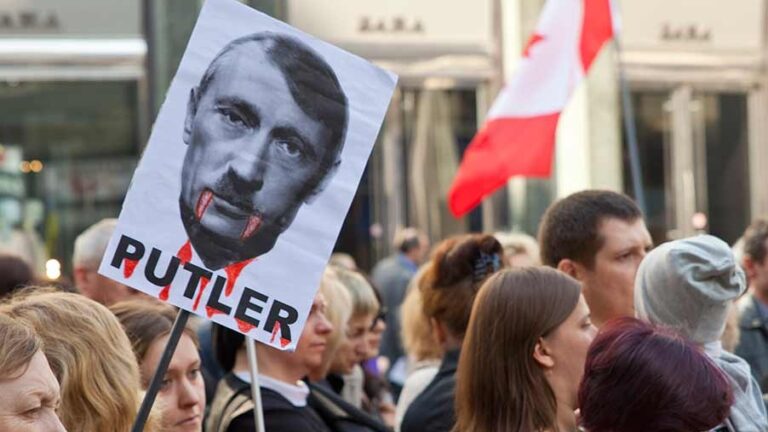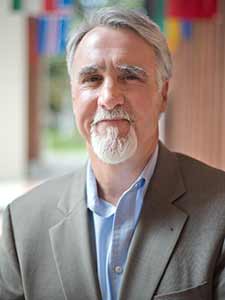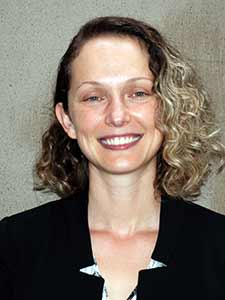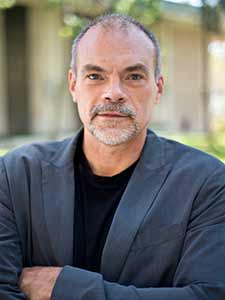
International symposium examines crisis in Central Europe, launches new major
The Cold War may be over, but Central Europe, now one of the world’s most strategically important and dynamic regions, today represents a precarious bridge between the West and an increasingly aggressive Russia.
“If in the 1990s the view in many Western capitals was that the Soviet threat had vanished, and that Russia and Eastern Europe were now uniformly poised to become just like the West, that has given way in our own decade to an awareness of enduring difference, even at times of manifest tension,” said Thomas Seifrid, professor and chair of Slavic languages and literatures and co-director of Central European Studies.
“Former empires we thought extinct,” he added, “still cast long shadows on the present.”
Seifrid was speaking at an April 8 symposium that he moderated on the current tensions unfolding in Central Europe.
The symposium, which attracted attendees from the university and beyond, inaugurated a new major at USC Dornsife in Central European Studies. Created by the School of International Relations and the department of Slavic languages and literatures, the new major will be available in Fall 2016.
“This major will combine courses in politics, economics, history and business, as well as languages and culture, to provide undergraduate training that is rare, if not unprecedented, in its scope,” Seifrid said.
Deepening understanding of Central Europe
Titled “Crisis in Central Europe: Ukraine, Russia, Germany,” and including presentations by USC Dornsife scholars and international experts, the one-day symposium took place in the Franklin Room at the Ronald Tutor Center on USC’s University Park campus and was supported by the Hovel Foundation.

Robert English, associate professor of international relations, Slavic languages and literatures, and environmental studies. Photo by Peter Zhaoyu Zhou.
Russia is at the center of renewed tension in Central Europe. Under President Vladimir Putin, the country has retreated into isolationism while simultaneously pursuing its own agenda by invading Georgia, annexing Crimea, and stirring up separatist trouble in corrupt and poverty-stricken eastern Ukraine, Seifrid noted.
Robert English, associate professor of international relations, Slavic Languages and literatures, and environmental studies and co-director of Central European studies at USC Dornsife, explored sanctions, Europe’s dependency on Russian natural gas and the Russia-West rivalry over Ukraine in a session titled “Germany, Russia and the EU: The Politics of Energy and Security,” which also featured Ina Ruck, Washington, D.C., correspondent for ARD German Television.
“The popularity of Mr. Putin remains very high. Indeed, after the annexation of Crimea, it increased,” English said. “Despite sanctions, Russia has remained very strong and is still able to act with impunity. Its foreign policy has not been moderated by economic pressure.”

Evis Mezini, lecturer in the School of International Relations. Photo by Susan Bell.
USC Dornsife’s Evis Mezini of international relations, along with Andrea Mammone of the University of London, discussed refugees, nationalism and EU solidarity.
“Creating the sort of divisions that have started to emerge within the EU between the Visegrad countries — Hungary, Czech Republic, Poland and Slovakia — that are less supportive of asylum seekers and the Mediterranean countries that criticize them for being so and for implementing stricter border controls, can be very detrimental to the future of the union,” Mezini said.

Thomas Seifrid, professor and chair of Slavic languages and literatures. Photo by Peter Zhaoyu Zhou.
Seifrid agreed, noting that Russia isn’t the only source of unrest in the region.
“Resistance to ever tighter integration into the EU has arisen in other eastern European countries as well, sometimes fueled by nationalist ideologies which see the EU, and even the West in general, as something foreign, something inimical to the native interests of countries such as Hungary, Slovakia or Poland, among others,” Siefrid said. “This means that history is very much alive and relevant in Central Europe. And as new economic, political and military phenomena also complicate affairs, Central Europe is now in a pronounced state of flux, and — arguably — crisis.”
Other participants in the symposium included Joachim Diec of Jagiellonian University in Kraków, Poland, and Andrei Tsygankov of San Francisco State University, who discussed Russia and East-Central Europe after Ukraine.
English noted that students often don’t realize until late in their undergraduate careers the unique combination of skills demanded to work in the various fields linked to Central Europe — from business and diplomacy, to intelligence or human-rights advocacy.
“Those who possess the political and economic training, the language skills and cultural background, find many exciting career options open to them,” he said. “And it is this training that the major in Central European Studies offers.”